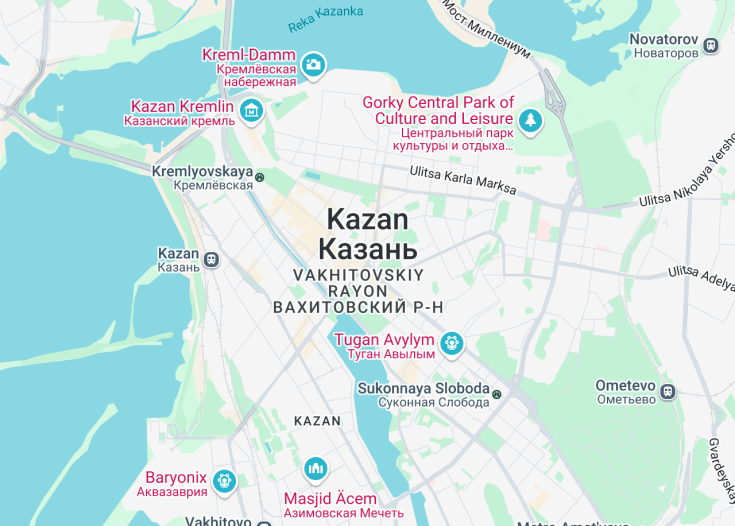Kazan, the capital of Tatarstan in Russia, is a fascinating city that thrives on a unique blend of Muslim and Christian cultures. This UNESCO World Heritage site boasts incredible sites like the Kazan Kremlin with its striking Kul Sharif Mosque and the old Tartar quarter with traditional limestone houses. Visitors can explore a rich tapestry of history, engage with vibrant arts scenes, and enjoy local cuisine that underscores the city’s cultural fusion.
When visiting Kazan, ensure to see a performance at the illustrious Kamal Theatre; it offers English subtitles to cater to non-Russian speakers.
Plan your visit in early August to experience the vibrant celebrations of the Kazan City Day, complete with fireworks and street festivals.
Top things to do & see in Kazan
Select the following sights and activities to discover best tickets and tours available in Kazan.
Kazan: A Confluence of Cultures
| Country | Russia |
| Time in Kazan | GMT+3 |
| Language spoken | Russian |
| Population | 1,243,500 (2021 estimate) |
| Currency | Russian Ruble (₽, RUB) |
| Airports |
|
Kazan, the capital of Tatarstan in Russia, stands on the banks of the Volga and Kazanka Rivers. This UNESCO World Heritage Site offers a remarkable blend of Christian and Islamic culture. It’s one of Russia’s oldest cities, where historic buildings like the Kazan Kremlin facade, which showcases the distinctive blue-and-gold towers of the Annunciation Cathedral and the famous Qolşärif Mosque, tell stories of a rich and complex history.
Today, Kazan is also a vibrant hub for education, culture, and sports, often referred to as the “Third Capital of Russia”, showcasing an exemplary balance between ancient heritage and modern lifestyle.
Where is Kazan?
Kazan is situated in the southwestern part of Russia, at the confluence of the Volga and Kazanka rivers.
Distances:
| Route | Distance by car | Time by car |
|---|---|---|
| Moscow to Kazan | 450 miles (724 kilometers) | Approx. 12 hours |
| St. Petersburg to Kazan | 800 miles (1287 kilometers) | Approx. 14 hours |
| Nizhny Novgorod to Kazan | 250 miles (402 kilometers) | Approx. 5 hours |
What is Kazan famous for?
Kazan is renowned for its rich cultural heritage, hosting both a UNESCO-listed Kremlin and being a focal point for Tatar culture and cuisine. It’s also a notable educational and sports center in Russia.
History
Pre-13th Century: Early Settlements
The region of Kazan began as a settlement before recorded history, with evidence of human presence dating back millennia. Archaeological findings indicate that ancient tribes inhabited areas around the Volga and Kazanka rivers, benefiting from the rich natural resources and strategic location for trade and migration.
1438-1552: The Kazan Khanate
Kazan’s significance grew remarkably in the early 15th century when it became the capital of the Kazan Khanate. During this period, the city was a significant center on the Silk Road, contributing immensely to the cultural and economic exchanges between Europe and Asia. The Kazan Khanate was known for its fierce warriors and a thriving marketplace that attracted merchants from across the known world.
1552-Present: Russian Influence and Modern Growth
The fall of Kazan to Ivan the Terrible in 1552 marked a significant shift, as Kazan was incorporated into the Russian Empire. In the centuries that followed, Kazan became a center of education, science, and culture in Russia, particularly noted for its university founded in 1804. Today, Kazan remains an important cultural and economic hub in Russia, celebrated for its rich tapestry of Tatar and Russian heritage, and a host of modern developments that reflect its dynamic history.
Visit Kazan
What to See and Do in Kazan
Explore the rich tapestry of culture and history in Kazan. Key attractions include:
- The Kazan Kremlin, a UNESCO World Heritage site, with its stunning Suyumbike Tower and the Annunciation Cathedral.
- The Kul Sharif Mosque, one of the largest in Europe, offering breathtaking architecture and a peaceful atmosphere.
- The National Museum of Tatarstan, showcasing extensive exhibits on regional history and culture.
- Visit Bauman Street, a vibrant pedestrian boulevard lined with shops, cafes, and historical buildings.
Discover these and other fascinating spots in this historic city.
Festivals and Events in Kazan
Kazan hosts a variety of cultural and sports events throughout the year. Notable among them is the ‘Kazan International Festival of Muslim Cinema’, held every September, which showcases films from Muslim countries. Additionally, the city comes alive during the ‘Sabantuy’, a traditional Tatar festival celebrating plough and sowing, occurring in early June. These events reflect the rich cultural heritage of the city.
Best Time to Visit Kazan
For the most pleasant weather and numerous cultural events, the best time to visit Kazan is between late spring and early autumn, specifically from May to September. This period offers comfortable temperatures and a vibrant city atmosphere, ideal for exploring all that Kazan has to offer.
Is Kazan Worth Visiting?
Kazan presents a unique blend of Tatar and Russian cultures, featuring impressive historical architecture, vibrant festivals, and rich cultural heritage. However, potential visitors should be aware of the cold winter months, which can be harsh but also offer a picturesque snowy landscape. If cultural diversity and historical exploration appeal to you, Kazan is certainly a destination worth considering. Nevertheless, due to its particular climate and location, those who prefer more temperate and consistent weather might find certain times of the year more challenging for a visit.










